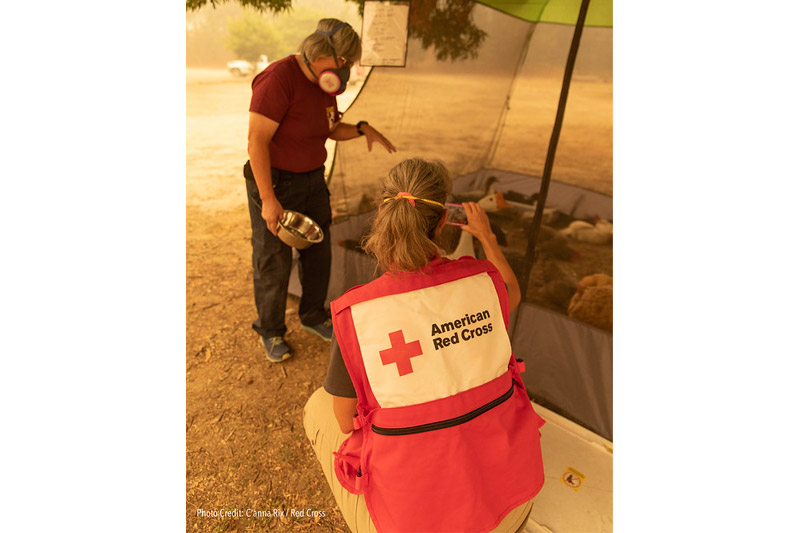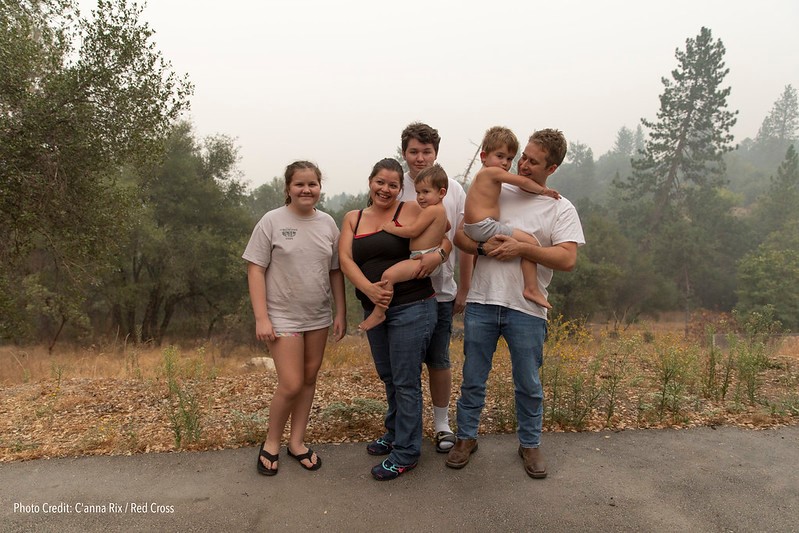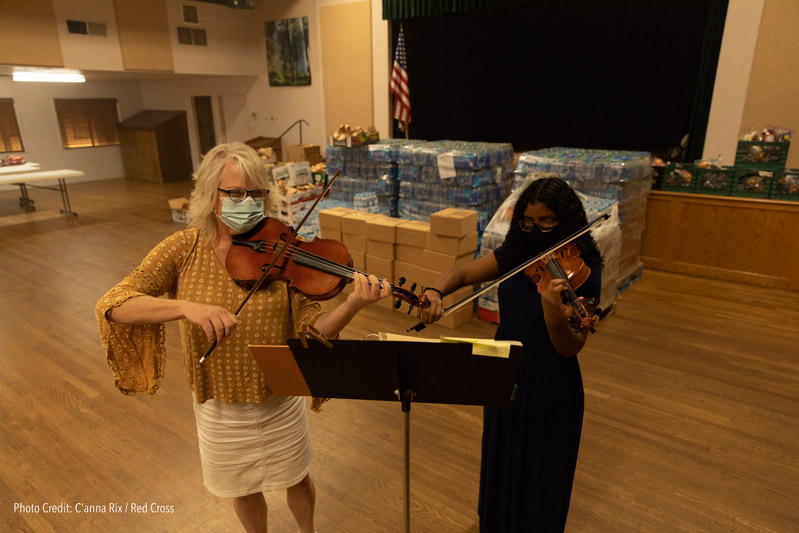There are currently more than 90 large wildfires burning across the west, forcing tens of thousands of people to evacuate and consuming more than 5 million acres. The American Red Cross has mobilized a massive relief effort across three states and is working around the clock to ensure that people have a safe place to stay, with food, comfort and other assistance during this time of uncertainty.
IN OREGON, Denise Everhart, division disaster executive for the Pacific Division of the Red Cross, gave this account of the situation:
“I wish I knew a stronger term to describe how unexpected, unmanageable and unpredictable the fires in Oregon were. The winds started and almost immediately fires popped up. The Red Cross started opening temporary evacuation centers and firefighters started trying to get the blazes under control. The fires kept starting and merging, and becoming bigger and harder to control. Another day passed. The fires got bigger. And more people evacuated. The Red Cross continued to open temporary evacuation points, put people in hotels, and started opening shelters.
“Friday morning there were people in shelters, RVs and sleeping in cars and tents. We knew we had a substantial population in our shelters and we were filling hotel rooms for non-congregate sheltering as fast as we could. We were also serving meals to folks in hotels. We worked with partners to determine the need and had Red Crossers helping from the area as well from across the country.
“The Red Cross workers on the ground or helping virtually, they are heroes, making a difference in people’s lives right now, and they are the ones that will help Oregonians recover from this disaster. Know that the entire Red Cross, the state and the country are in awe of the generosity of the American Red Cross donors and the power of our volunteers to prevent and alleviate suffering.”
IN OAKHURST, CALIFORNIA,16-year-old violinist Nyanza Williams and her music teacher, violist Licia Clark visited the Oakhurst Community Center to play for the Red Cross volunteers. The facility serves as the Red Cross feeding headquarters for the Creek Fire response.
“It’s going to sound like an oxymoron but this is a breath of fresh air to come do this,” said the 16 year-old.
The pair of elegantly dressed musicians gave an impromptu concert for several hours to the delight of dozens of masked volunteers from the Red Cross, Southern Baptist Disaster Relief Team and churchgoers from local parishes. The volunteers work every day, following CDC COVID-19 guidelines, readying hundreds of utensil packets, napkins and meals, which they deliver three times a day to evacuees at area hotels where meals are not otherwise provided.
“I thought it was the radio,” says Red Cross feeding volunteer Kelly Peck, who was stunned to emerge from the back office to find live music in the hall. “Everyone’s spirits are soaring; it’s such an unexpected treat for us.”
Like teens across the country, Nyanza hasn’t seen her friends, been to school, or played with other musician colleagues for six months. “I was feeling down because of COVID. Being isolated was hard emotionally. Coming here, it’s something bigger than myself to see how everyone is coming together to help out. I’m so happy I could come do what I was created to do — make music.” She added, “It was exactly what I needed.”
CARING FOR THE ANIMALS “The best part is helping the pet owners. Being able to care for their animals relieves their stress so much,” explains Betty Wong, who has volunteered with the Central California Animal Disaster Team (CCADT) since it’s inception in 2013. “The animals feel their owners’ stress, and we can help with that.”
Wong spends her volunteer shifts with CCADT caring for some 185 animals located in and around a building near thea Red Cross . The site, caring for dogs, cats, geese, chickens, ducks, rabbits, parrots and parakeets, and whatever other fur or feathered friends evacuees bring in, is at the Oakhurst Community Center in the Sierra Nevada foothills near the Creek Fire. There is a site for large animals too.
“The most unusual pets I’ve cared for over the years were chinchillas, which are very fragile, and a bearded dragon,” recalls Wong. “We keep clean water in their cages and feed them as needed. Mostly the owners come daily, and feed and exercise their pets.”
“When owners return home and see their house is okay, they are so relieved and they pass that feeling onto their pets. You can see it. I love that.”
The Red Cross and CCADT are long-time partners in disaster relief so that families can have the peace of mind that their pets are safe in times of emergency.
ONE FAMILY’S STORY: “The Red Cross kept us from having to sleep in a parking lot,” said Stacey Dey, a native Mono from North Fork Rancheria. She evacuated her family of six on Labor Day Weekend as they watched the Creek Fire steadily approach their home from across the valley. “We took all our camping gear because we really thought we would end up down by the river with nowhere else to go.”
The Punkin-DePalma family consists of Stacey, her fiancée Jason DePalma, and their four children: Ta-weh (15), Kaleia (14), Joshua (4) and Makiah (2). “We registered at the drive-up temporary evacuation point at the Mariposa Fairgrounds, and in ten minutes the Red Cross sent us a text saying they had a hotel room for us,” recalls the relieved mother. It was at The Monarch, a boutique hotel.
Sunday afternoon, the evacuation order was lifted for North Fork Rancheria and the Punkin-DePalmas excitedly packed their vehicles to head for home. “Thank you so much! You guys have been awesome,” Stacey said as she signed out of the hotel. “We appreciate everything and I’m glad I met everyone here.”
It’s critical that those in the path of wildfires listen to the advice of local authorities and evacuate immediately if asked to do so. Follow CDC guidelines around social distancing and wear a face covering to ensure that your evacuation is as safe as possible. To find a safe place to stay, listen to local officials for evacuation guidance including the nearest temporary evacuation point. You can also visit redcross.org or view open shelters through the Red Cross Emergency app. If you don’t have access to a computer or smart phone, try calling 211, if this service is available in your area, or call 800-RED-CROSS (800-733-2767).
Due to COVID-19, the Red Cross is unable to welcome pets into our shelters for everyone’s safety; we are working with partners to establish co-located pet shelters. If you are evacuating with pets, please consider visiting RedRover.org/WesternFires to view their resource list of pet-friendly evacuation shelters and tips.
Help people affected by the western wildfires by visiting redcross.org, calling 800-RED CROSS or texting the word WILDFIRES to 90999 to make a $10 donation. Donations enable the Red Cross to prepare for, respond to and help people recover from these disasters.
Want to help people specifically affected by the California, Oregon or Washington wildfires? Write “California Wildfires,” “Oregon Wildfires” or “Washington Wildfires” in the memo line of a check and mail it to your local Red Cross chapter with the completed donation form. For California Wildfires you can also text the word CAWILDFIRES to 90999 to make a $10 donation.














